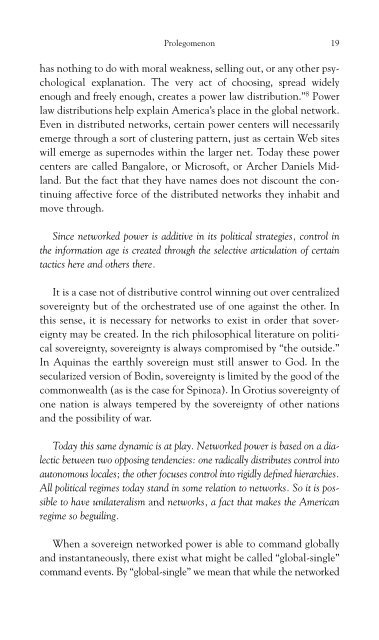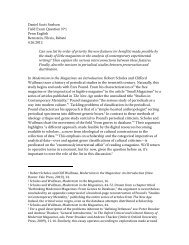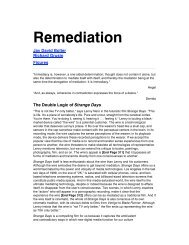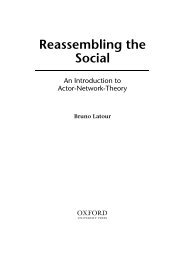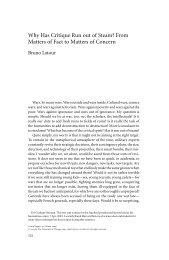The Exploit: A Theory of Networks - asounder
The Exploit: A Theory of Networks - asounder
The Exploit: A Theory of Networks - asounder
Create successful ePaper yourself
Turn your PDF publications into a flip-book with our unique Google optimized e-Paper software.
Prolegomenon 19<br />
has nothing to do with moral weakness, selling out, or any other psychological<br />
explanation. <strong>The</strong> very act <strong>of</strong> choosing, spread widely<br />
enough and freely enough, creates a power law distribution.” 8 Power<br />
law distributions help explain America’s place in the global network.<br />
Even in distributed networks, certain power centers will necessarily<br />
emerge through a sort <strong>of</strong> clustering pattern, just as certain Web sites<br />
will emerge as supernodes within the larger net. Today these power<br />
centers are called Bangalore, or Micros<strong>of</strong>t, or Archer Daniels Midland.<br />
But the fact that they have names does not discount the continuing<br />
affective force <strong>of</strong> the distributed networks they inhabit and<br />
move through.<br />
Since networked power is additive in its political strategies, control in<br />
the information age is created through the selective articulation <strong>of</strong> certain<br />
tactics here and others there.<br />
It is a case not <strong>of</strong> distributive control winning out over centralized<br />
sovereignty but <strong>of</strong> the orchestrated use <strong>of</strong> one against the other. In<br />
this sense, it is necessary for networks to exist in order that sovereignty<br />
may be created. In the rich philosophical literature on political<br />
sovereignty, sovereignty is always compromised by “the outside.”<br />
In Aquinas the earthly sovereign must still answer to God. In the<br />
secularized version <strong>of</strong> Bodin, sovereignty is limited by the good <strong>of</strong> the<br />
commonwealth (as is the case for Spinoza). In Grotius sovereignty <strong>of</strong><br />
one nation is always tempered by the sovereignty <strong>of</strong> other nations<br />
and the possibility <strong>of</strong> war.<br />
Today this same dynamic is at play. Networked power is based on a dia -<br />
lectic between two opposing tendencies: one radically distributes control into<br />
autonomous locales; the other focuses control into rigidly defined hierarchies.<br />
All political regimes today stand in some relation to networks. So it is possible<br />
to have unilateralism and networks, a fact that makes the American<br />
regime so beguiling.<br />
When a sovereign networked power is able to command globally<br />
and instantaneously, there exist what might be called “global - single”<br />
command events. By “global - single” we mean that while the networked


